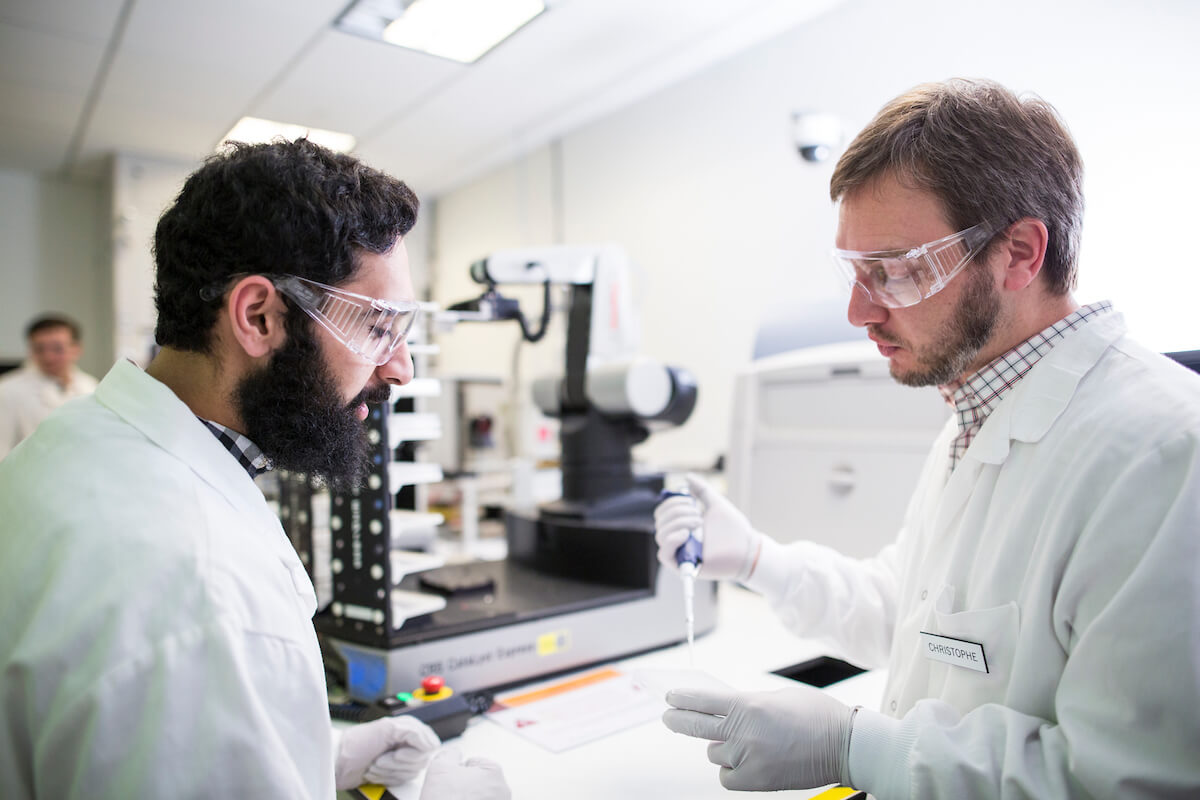Choosing a master’s degree program is no easy task, especially within the field of biotechnology. With more than 100 programs available nationwide, it’s important for prospective students to do their research and find the one that will best prepare them for a successful career. The quality of your classes, the experience of faculty members, and the ability to apply your skills to the real world can all impact your decision.
Consider the following factors when choosing the best biotechnology master’s program for you.
Download Our Free Guide to Advancing Your Biotechnology Career
Learn how to transform your career in an industry that’s transforming the world.
Industry-Aligned Classes
Biotechnology is a multidisciplinary field that involves science, business, technology, research, and more. A strong biotechnology master’s program will not only equip students with those skills, but its courses will also adapt to changing industry trends to ensure that students receive the most up-to-date information possible.
Northeastern’s curriculum was developed with the help of an industrial advisory board made up of experienced biotech and pharmaceutical professionals. By communicating with this board and with industry partners in a wide range of businesses, faculty members can continue to develop programs based on pressing professional needs. This connection with business leaders helps Northeastern provide its students with courses that directly relate to needed skills alongside foundational classes in biotechnology.
These new courses often come in the form of additional concentrations, such as agricultural biotechnology and biodefense, that students can undertake to deepen their expertise in an in-demand area.
Faculty Experts
Advancements in gene therapy and vaccine development, among other areas, are changing the industry at a rapid pace. Our biotech faculty members play a crucial role in ensuring that students are aware of these and other emerging trends. And while keeping up with industry news is important, nothing can replicate the benefit of having the first-hand experience in the industry. Professors who are still working in biotechnology, or who had extensive experience within it before their careers in academia, provide unique insight that can give students a competitive advantage when they enter the field.
About 90 percent of Northeastern’s biotechnology faculty members still work in the industry while teaching at the university. These professors bring their real-world experience to the classroom every day, giving students better insight into the tools they need to become trusted biotechnology professionals.
Real-World Experience
The best biotechnology master’s programs will also give students the opportunity to experience the industry for themselves through research in faculty labs, internships, and more. These allow students to not only connect their studies to the real world but to use their problem-solving skills and knowledge of the field to make an impact before they graduate.
There are several ways students can gain this experience. Nearly every university will offer on-campus, faculty-led labs and research institutes, where students can contribute to cutting-edge research using the skills they’ve learned in class. Universities also encourage students to undertake summer internships with relevant businesses.
Northeastern takes the internship experience to a new level with its co-op program. The university’s biotech master’s program requires students to complete at least one four- to six-month co-op, during which they work full-time for a biotech company of their choice. These co-ops can take place anywhere in the world and allow students to explore trends, network with biotech leaders, and develop working relationships with potential employers. Most students complete their co-op after spending some time in the classroom and return to their studies afterward, allowing their learning and co-op experiences to reinforce each other and deepening their knowledge.
Students who complete co-ops will graduate with full-time work experience on their resumés, a better understanding of what it’s like to work in biotech, and the ability to put their classroom learning into action. These provide a valuable advantage in a competitive industry.
Northeastern students don’t have to leave the classroom to get real-world experience, however. The university’s Experiential Network (XN) connects business partners around the world with students every day. These businesses share their data and current challenges with students, who analyze the information and make recommendations as part of their classroom assignments.
Choosing the Right Program for You
A biotechnology master’s program should do more than give you the business, technical, and scientific knowledge you’ll need to complete a job. It should also show you how those skills integrate with the real world, connect you with knowledgeable and supportive professors, and give you the opportunity to put your learning into action as soon as possible. While each student’s educational needs and goals will differ, these factors can benefit all students seeking a high-quality biotechnology education.
At Northeastern, dozens of faculty labs, highly experienced professors, and world-class experiential learning come together to create a master’s in biotechnology program that sets graduates apart. Students can expect a rigorous and industry-focused curriculum that prioritizes real-world applications of their skills, better preparing them to succeed in their chosen career path.
Explore the biotech master’s program page here for more information about what it’s like to earn your degree at Northeastern.







Related Articles
Compliance Specialists: Who They Are and What They Earn
Science or Science Fiction? The Future of Personalized Medicine
In-Demand Biotechnology Careers Shaping Our Future